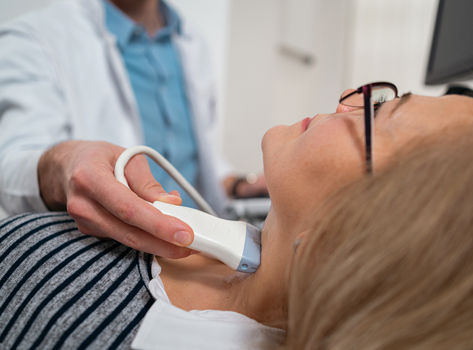No one wants to hear those words: You have thyroid cancer.
Unfortunately, cases of thyroid cancer are on the rise. But the news isn’t all bad. Thyroid cancer is treatable — especially when caught early.
Bhanu Iyer, MD, an endocrinologist with Atlantic Health System, explains the basics of thyroid cancer and what you should watch for.
What is thyroid cancer?
The thyroid is a butterfly-shaped gland located just below the Adam’s apple in the lower front of your neck. Your thyroid produces hormones that regulate your metabolism, weight, heart rate, blood pressure and body temperature.
Thyroid cancer is an abnormal growth of cells in the thyroid gland that form a tumor or mass (called a thyroid nodule). Thyroid nodules can be benign (noncancerous) or malignant (cancerous).
Biopsies help determine whether a nodule is cancerous. A thyroid biopsy is a standard outpatient procedure performed in a hospital, clinic or doctor’s office. Using a thin needle, a sample of cells from the mass is removed, and the cells are examined.
Is thyroid cancer curable?
Only about 10% of thyroid nodules are cancerous. Luckily, most thyroid cancers are very treatable.
“If you had to develop a cancer in your lifetime, thyroid cancer is the one to get because it’s the most treatable and slowest to spread,” says Dr. Iyer.
Signs of thyroid cancer
According to Dr. Iyer, cancers arising in thyroid nodules generally do not cause any symptoms and thyroid function tests are typically normal, even when you have cancer. Often, thyroid nodules are discovered incidentally on imaging tests like CT scans, carotid dopplers or ultrasounds done for completely unrelated reasons.
Rarely, you may experience the following symptoms:
- A lump felt or seen in the neck
- Swelling or a feeling of fullness in the neck
- Difficulty breathing or swallowing, if the nodule is large enough to compress your windpipe or food pipe
- Hoarseness or a change in the sound of the voice
- Enlarged lymph nodes in the neck
“It’s not uncommon for people to have a thyroid nodule—benign or malignant—and not feel it,” says Dr. Iyer.
Risk factors for thyroid cancer
Doctors and scientists don’t know what causes the changes in genes that lead to cancer, but some factors may put you at a higher risk of developing thyroid cancer.
Risk factors include:
- High-dose radiation exposure to the face, neck, chest or head
- Family history of thyroid cancer (genetic inheritance)
- Certain genetic conditions, such as multiple endocrine neoplasia syndrome
- Low iodine levels
Treatment options for thyroid cancer
Treatment for thyroid cancer depends on the type and size of the tumor and whether it has spread.
Recent studies suggest that for papillary thyroid microcarcinomas (thyroid cancer less than one centimeter in size—smaller than a pea or the eraser on a pencil), most often no treatment is necessary. You can be monitored very safely without surgery by serial thyroid ultrasounds.
For thyroid cancers larger than one centimeter, the first step in treatment is surgery. You may have a lobectomy to remove only the side with the cancer or a total thyroidectomy to remove the entire thyroid.
Following surgery, you’ll need an ultrasound of your neck and blood work every six months to a year to monitor your thyroid for the first 3 to 5 years, and less frequently thereafter. You’ll also need to take thyroid hormone replacement medication for the rest of your life. An endocrinologist will manage your care.
If your doctor thinks the cancer might come back, you may be treated with radioactive iodine. This treatment can help remove lingering cancer cells and thereby help reduce the risk of recurrence.
When to see a doctor
If you’re experiencing any symptoms or have a personal or family history of thyroid disease, don’t hesitate.
“Start with your primary physician or gynecologist and ask for a neck exam,” says Dr. Iyer. “They’ll refer you to an endocrinologist, if necessary, for an ultrasound and biopsy.”
Be proactive about health
To stay safe and healthy, it's good to have a primary care provider who knows and understands your health history and wellness goals.












